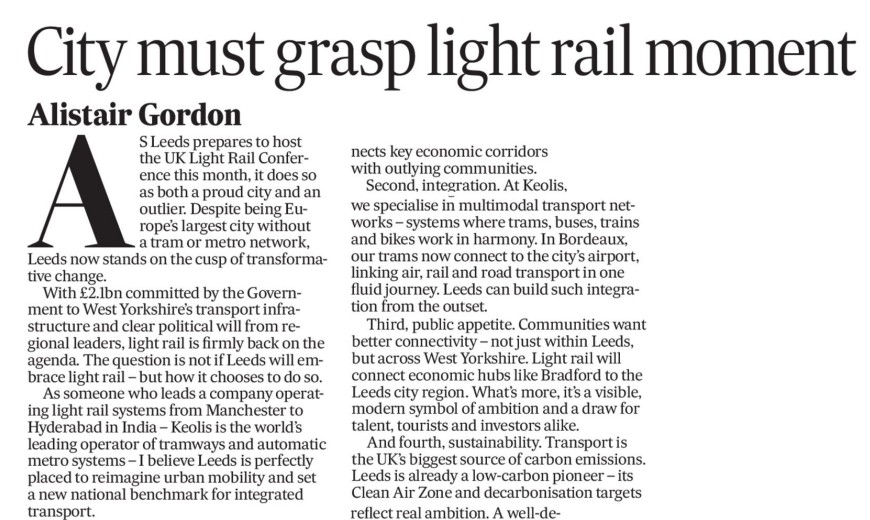Yorkshire Post, 17 July 2025

As Leeds prepares to host the UK Light Rail Conference this month, it does so as both a proud city and an outlier. Despite being Europe’s largest city without a tram or metro network, Leeds now stands on the cusp of transformative change.
With £2.1 billion committed by the Government to West Yorkshire’s transport infrastructure and clear political will from regional leaders, light rail is firmly back on the agenda. The question is not if Leeds will embrace light rail – but how it chooses to do so.
As someone who leads a company operating light rail systems from Manchester to Hyderabad in India – Keolis is the world’s leading operator of tramways and automatic metro systems – I believe Leeds is perfectly placed to reimagine urban mobility and set a new national benchmark for integrated transport. The city’s moment has arrived and it’s one that must be seized boldly.
Light rail isn’t just about rails in the road or shiny new vehicles. It’s about stitching a city together. In Greater Manchester, our Metrolink system – the UK’s largest – has more than four million passenger journeys a month. In Nottingham, our trams reach across the city, helping reduce congestion, cut emissions and support regeneration. And from Dijon to Dubai, we’ve seen how light rail, done well, can become a backbone for economic growth, social mobility and urban resilience.
So why is it right for Leeds?
First, scale. Leeds’ growing population – the Office for National Statistics recently revealed the city is set to grow by eight per cent between 2022 and 2033 – and its economic pull across West Yorkshire demand a transport system that can match ambitions. Buses, valuable as they are, cannot shoulder this burden alone. A modern tram network offers high capacity, low-emission mobility that fits seamlessly into the urban fabric and connects key economic corridors with outlying communities.
Second, integration. At Keolis, we specialise in multimodal transport networks – systems where trams, buses, trains and bikes work in harmony. In Dijon, we helped develop a Mobility as a Service (MaaS) app integrating trams, buses and parking into a single digital platform. In Bordeaux, our trams now connect to the city’s airport, linking air, rail and road transport in one fluid journey. Leeds can build such integration from the outset.
Third, public appetite. Communities want better connectivity – not just within Leeds, but across West Yorkshire. Light rail will connect economic hubs like Bradford to the Leeds city region. What’s more, it’s a visible, modern symbol of ambition and a draw for talent, tourists and investors alike.
And fourth, sustainability. Transport is the UK’s biggest source of carbon emissions. Leeds is already a low-carbon pioneer – its Clean Air Zone and decarbonisation targets reflect real ambition. A well-designed light rail system can turbocharge that journey by using greener electricity and ensuring the design minimises energy consumption. Across the world, our 26 tram and 8 metro networks consistently deliver cleaner, quieter, more people-centred urban environments.
Crucially, success depends on more than just infrastructure. It’s about putting people at the heart of operations. At KeolisAmey Metrolink in Manchester, we’ve created close to 1,000 local jobs, pioneered apprenticeship schemes and partnered with community organisations to tackle anti-social behaviour and improve passenger safety. Leeds’ approach should be no different: civic-minded, locally grounded, and globally informed.
The world is watching
Leeds has a once-in-a-generation opportunity not just to catch up with cities like Manchester, Birmingham and Nottingham, but to leap ahead. To build a 21st-century network that supports inclusive growth, tackles climate change and delivers a step change in quality of life for the people of West Yorkshire.
But it will take a commitment to integration, not duplication. It will take partners with a proven track record in delivery, not just design. And it will take an unshakeable focus on serving the communities who rely most on public transport every day.
As a city built on ambition, Leeds is ready to rise to this challenge.
Now is the time for Leeds to lead.